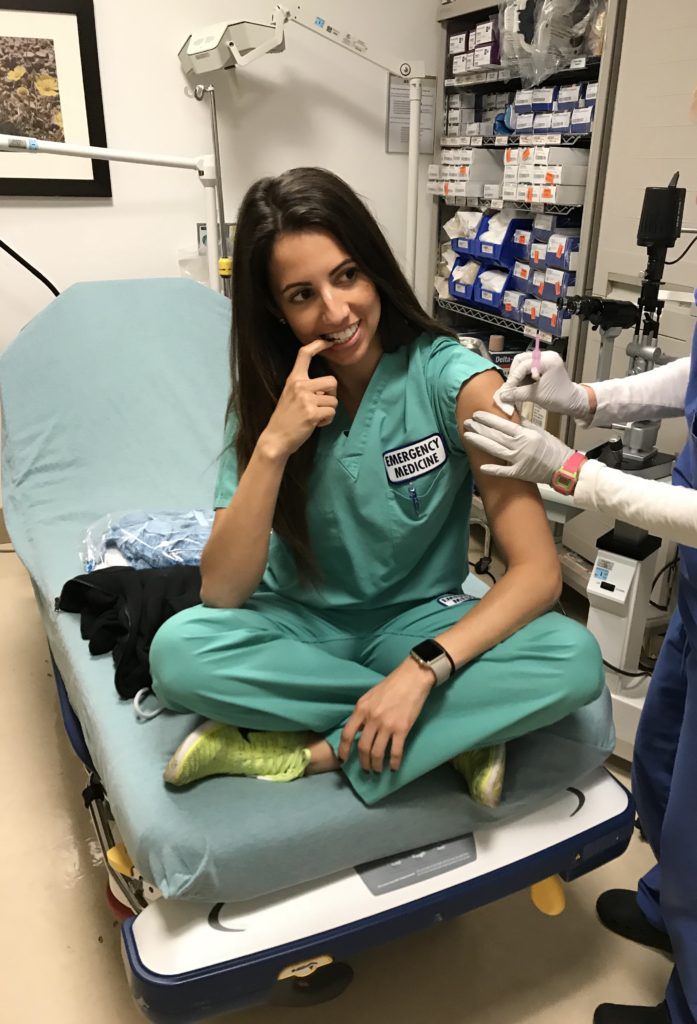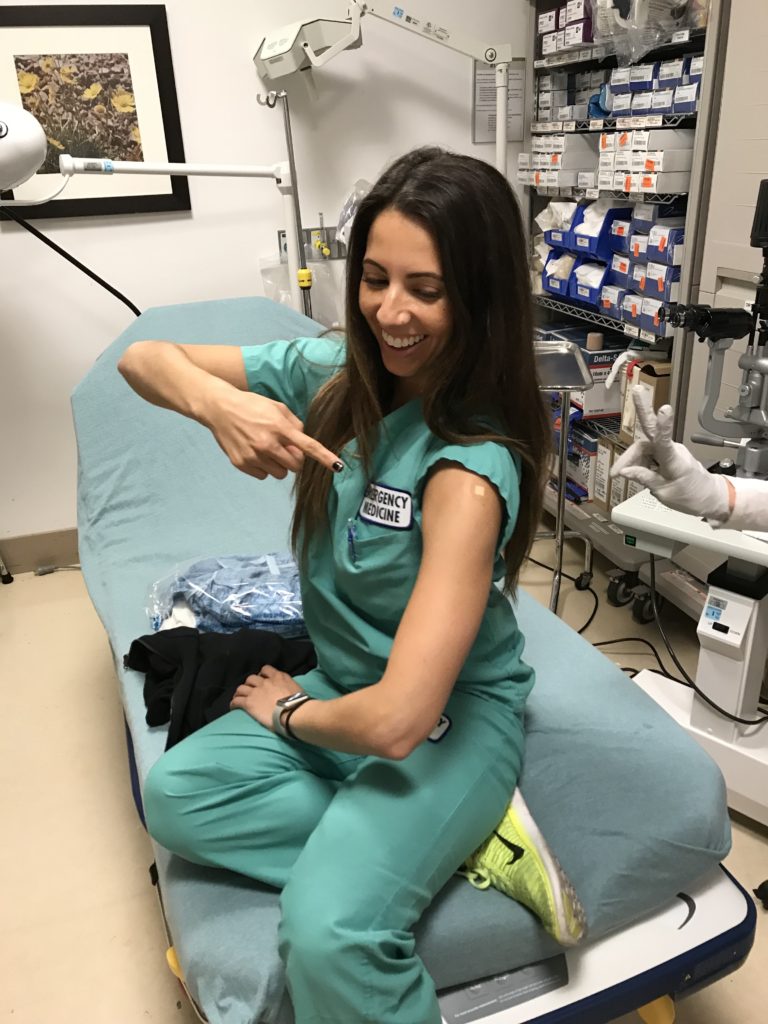
The flu… aint nobody got time for that!
Yep, I get the flu shot. Every year. It doesn’t matter if I never had the flu, the years that I didn’t get the shot. I can’t take any chances in my workplace. Calling off sick is not an option, so I do everything I can. Just because I’m a doctor, doesn’t mean that needles don’t scare me. I’m not a needle-phobic, but every year I do find myself trying to put off my flu shot and any other blood work or vaccines I may need! Vaccinations may be a touchy subject these days, but I still find that the majority of my patients are vaccinated.
Many people wonder, “should I get the flu shot”?
The virus changes each year, therefore so does the vaccine. Some years the vaccine has more preventative effects than others. One of the most common statements I hear from patients is, “well my friend had the flu shot but she still got the flu”. Yes, you can still get the flu after receiving the vaccine, BUT the risk is much lower.
Influenza is a serious illness that can lead to prolonged time off of work, hospitalization, and even death. I have unfortunately seen many healthy individuals get VERY sick from the flu. Flu season is typically slotted from November to May, at the latest. The optimal timing for vaccination cannot be predicted, but it is generally recommended vaccination take place prior to onset of typical “flu season”.
Everyone 6 months of age and older should get a flu vaccine, as recommended by the Centers for Disease Control and Prevention . This is particularly important for those who are at high risk of serious complications from the flu. This list is long… but some of these people include:
- Adults >65yo
- Nursing home residents
- Pregnant women
- Children <5yo
- Immunosuppressed patients
In addition to those listed above, healthcare workers who have contact with patients, and those caregivers or household family members that care for chronically ill patients, are also at high risk, and should prioritize getting the vaccine.
Most people who get the flu will have mild illness and will recover in less than 2 weeks. But some people are more likely to get complications from the flu such as bacterial infections after the initial virus, worsened chronic health problems, etc.
There are various forms of the vaccine including an injectable form and intranasal form. However, this year, the intranasal form is not recommended.

Common Questions
Some of the most common questions I receive from patients (and from you all), are listed below.
- I have never had the flu, why would I get the shot now?
- Just because you have been lucky enough to not contract the virus yet, as you age and your health changes or your exposures change, you might! Trust me, you will not be happy on that day. I like to use a little analogy here to play devil’s advocate. If you’ve never used a condom in your life and are sexually active and sleeping with multiple people, you know you’re putting yourself at risk for not only pregnancy but also sexually transmitted infections. So you haven’t gotten pregnant or any infections yet. Might as well keep rolling the dice… right? SCARY. Ok, that example is extreme and terrifying, but you get my point. The flu would be a deal breaker for me and my job. So I don’t like to take those chances.
- What is the difference between a “cold” and “flu”?
- When we use the term “cold”, we really just mean a viral infection, most commonly known as the “common cold”. This could be any virus really, and there are TONS of different viral strains out there. We don’t test for many of them, because we know that they will improve with time and a patient’s health will be back to normal. There are specific viral infections that we do test for, either because we have a treatment for them OR we like to keep track of the number of cases in each county. Some examples of these are Influenza (the flu), West Nile Virus, HIV, and mononucleosis.
- Well my friend said they had the flu, so what does that mean?
- Many patients use the term flu when they really just mean they had a viral infection. If you are not tested for the flu (by your doctor), and test positive, you cannot confirm you actually had influenza.
- I will say, influenza can typically be spotted even without testing because patients feel much worse than they do with the common cold. However, this is not the case all of the time.
- I always get sick after the flu shot, why is that?
- This is a very common complaint from patients and even healthcare workers! Although you may feel sick and believe it is caused directly by the vaccine, it’s actually your immune response to the vaccine and something foreign in your body. That’s the whole point. You are activating a response in your body, to the influenza virus, so it resembles your body fighting an infection. This can include body aches, chills, even sore throat and congestion sometimes. When your body is exposed to the virus in the future now, the hope is that you will have built antibodies (a fighting system) to attack the virus and avoid being sick.
- The symptoms experienced after a flu shot are typically mild and definitely not as bad as the illness itself. You may experience soreness and redness at the site. I always have a sore arm for a day or two.
- I will say this description above is highly controversial and many sources/medical professionals will explain this differently. This is what makes sense to me based on my research and clinical experience.
- Can I still get the shot if I am sick?
- It is recommended that you do not get the flu vaccine if you have a fever. You can receive the vaccine once your fever has resolved. If you have mild congestive symptoms without fever, you can still receive the flu vaccine. I would typically wait until I feel better, however.
- Is the “stomach flu” really the flu?
- No. A stomach flu is a term that is used to describe nausea, vomiting, and diarrhea. Although this is typically due to a viral infection, it is not influenza.
Disclaimer: this is a brief discussion on the vaccine
Talk to your doctor about whether or not the flu vaccine is for you! And remember regardless to educate yourself on symptoms of the flu and how it may affect you, if you are unfortunately affected.



I am 3 months pregnant and in my mid 20’s. My OB recommends the flu vaccine. Generally speaking, is it safe for my baby? I.e. no complications. I’ve had the vaccine before with no allergic reaction however never while pregnant.
Yes it is perfectly safe and a good idea.
I am so sorry this is a late reply! I absolutely recommend it to pregnant women. If pregnant women get influenza, it can really take you down which in turn may cause distress for the baby.
Love reading your block just completed my first year of medschool. Would like to know more about emergency medicine and how do you find it ?
I contracted West Nile this summer, can / should I get the flu shot?
YES! West Nile is a different virus. It will not affect your getting the flu shot.